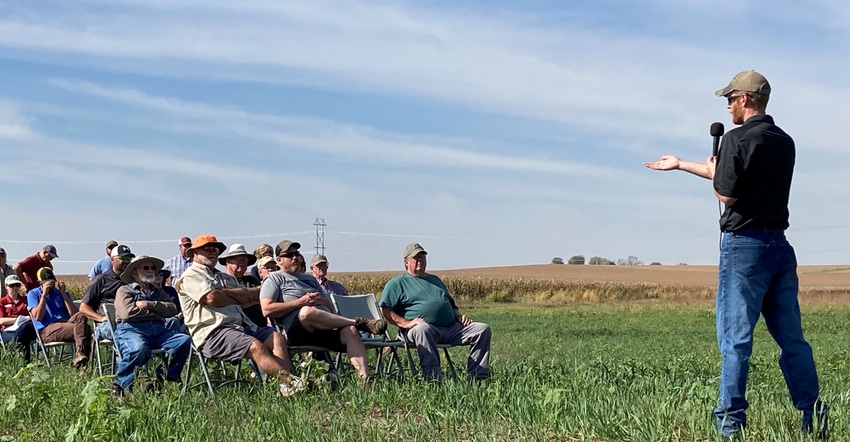May 6, 2022

In 2021, many organizations were hoping to recover from the shock of the COVID-19 pandemic, only to have their aspirations dashed by multiple waves of illness and restrictions that made in-person activities difficult if not impossible. However, for Iowa Learning Farms, the year was quite successful despite these challenges.
Aggressively pursuing its goal of creating a culture of conservation, ILF has a long history of integrating online programming with its more traditional outreach activities such as field days and public education outings to county fairs and other venues. On this foundation, the ILF team expanded how outreach was accomplished, and along the way extended the reach of the programs geographically and demographically.
“The demand for information and education continued, and, in many ways, increased during the pandemic,” says Jacqueline Comito, ILF director. “Capitalizing on the societal shift in trust and access to online education, outreach and resources, ILF expanded its online and livestreamed options for audiences to experience science- and research-based information regarding best practices in agriculture, land management and environmental science.”
In its 2121 evaluation report, ILF noted it had hosted 11 virtual field days, seven in-person field days and 49 webinars, which were attended live by 5,293 participants. In addition, the ILF team and Conservation Station trailer fleet reached an additional 6,418 people through 80 outreach events ranging from guest presentations to community events and county fairs.
Two major online enhancements to ILF programs were virtual field days and weekly conservation webinars. Feedback and evaluation from each have shown significant interest and acceptance, and also revealed some interesting trends in audience makeup and frequency of participation.
A new kind of field day
How can you be in the field and virtual at the same time? With some careful planning and advance filming, ILF found the virtual field day format not only provides much of the same content and interaction of a live event, but also that the convenience and comfort of participating from home has its own rewards for the audience. The format also allowed audience members from 16 different states and Alberta, Canada, to participate.
“One interesting finding was that the opportunity to join virtually made it more likely attendees could participate in multiple events,” Comito says. “Participation in multiple field days is one factor that has shown a direct correlation to increased likelihood of conservation practice adoption. This is one area that we will watch as virtual and in-person field days continue in parallel.”
Archiving of the virtual field days has also enabled those not able to attend events in person to still benefit from those events — something that is not possible with traditional field days. Whether it’s live attendees taking another look, or new participants seeking information, archive views of the virtual field days are nearly three times the number of real-time participants.
Other unique findings from analysis of the virtual field days were: increased participation from younger farmers and female farmers — groups that ILF has worked to include in its outreach efforts. In addition, the report noted trends indicating that those who attended both in-person and virtual events also tended to be strong personal networkers who actively engage in seeking and sharing information with others.
Not to be overlooked, seven in-person field days were also conducted in fall 2021, with an average attendance of more than 30 participants.
Weekly conservation webinars offer something for everyone
ILF’s Wednesday noon Conservation Webinar Series has garnered tremendous participation and continues to attract broad audiences, with an average attendance of some 86 individuals and a total participation of 7,145 — including live and archived views.
“The introduction of more researchers and practitioners from across the country, as well as in-depth looks at the kinds of research and activities taking place in Iowa, has attracted audience members near and far,” Comito says.
Attendees have logged in from 18 states and Canada, and more than half identified as a farmer or a landowner, showing the webinars are another effective pathway to reaching this important constituency. Evaluation surveys of participants revealed a high participation level among females and a dramatic increase in repeat attendance. More than half of the people surveyed reported attending between three and 10 webinars in 2021.
To see the details of Iowa Learning Farms’ activities and influence in 2021, visit iowalearningfarms.org 2021 Year End Evaluation Report to view or download the report.
Favorite ILF conservation webinars
Surveying audience members regarding favorite ILF Conservation Webinar episodes, the variety of topics offered became clear in the responses.
Kay Stefanik and Adam Janke, Wetlands and Wildlife: A Conservation Case Study
Sotirios Archontoulis, Past, Present and Future Optimum N Rates for Corn
Laura Christianson, Around the World in 80 Bioreactors
Ripley is the Iowa Learning Farms manager and a Water Rocks! conservation outreach specialist. Conservation Learning Group is a collaborative team established to advance training, outreach and research across land uses and production systems to increase overall sustainability of agricultural and natural systems for multiple generations to come. CLG draws on experts in various disciplines to deliver engaging science-based outreach to farmers, agricultural advisers, landowners, decision-makers, youth and communities. To learn more about CLG, visit conservationlearninggroup.org.
About the Author(s)
You May Also Like




